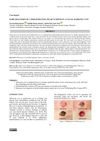 January 2023 in “Vìsnik problem bìologìï ì medicini”
January 2023 in “Vìsnik problem bìologìï ì medicini” Androgenic alopecia causes hair follicle degradation and skin restructuring, but some hair elements remain.
 November 2022 in “The journal of investigative dermatology/Journal of investigative dermatology”
November 2022 in “The journal of investigative dermatology/Journal of investigative dermatology” Different types of PPARγ are found in varying amounts in human skin and its parts, which could affect how skin treatments work.
 November 2022 in “JAAD case reports”
November 2022 in “JAAD case reports” A man with skin and hair symptoms improved partially with specific treatment.
 October 2022 in “Chinese Journal of Dermatology”
October 2022 in “Chinese Journal of Dermatology” Dry skin does not mean the skin's protective barrier is broken; it's often due to a lack of natural skin moisturizers.

COVID-19 can cause hair loss and nail issues, with treatments available for these conditions.
 August 2022 in “Aesthetic Cosmetology and Medicine”
August 2022 in “Aesthetic Cosmetology and Medicine” Certain plant extracts can effectively and safely reduce seborrhea when used in properly formulated scalp care products.
 July 2022 in “Skin research and technology”
July 2022 in “Skin research and technology” Skin CT can help diagnose rosacea by identifying specific skin features, but should be used with clinical signs to avoid misdiagnosis.
 March 2022 in “Folia Medica Indonesiana”
March 2022 in “Folia Medica Indonesiana” The lump on a woman's scalp was a rare, potentially cancerous tumor from the hair follicle, not a common cyst.
January 2022 in “Clinical Cases in Dermatology” A woman's scalp nodule was a common, harmless pilar cyst, treated by surgical removal.
 October 2021 in “The Egyptian Journal of Hospital Medicine ”
October 2021 in “The Egyptian Journal of Hospital Medicine ” Combination therapies work better than single treatments for atrophic acne scars.
August 2021 in “Oxford University Press eBooks” The skin is a complex organ that protects the body, regulates temperature, and has roles in immunity, hormone function, and vitamin D metabolism.
 March 2021 in “Bioscientia medicina”
March 2021 in “Bioscientia medicina” Androgen affects oil production and hair growth in the skin.
 March 2021 in “Bioscientia medicina”
March 2021 in “Bioscientia medicina” Androgens like testosterone affect oil production and hair growth in skin and hair follicles.
January 2021 in “Indian journal of veterinary pathology” A 15-year-old female labrador had a large ovarian tumor removed.
 October 2020 in “Our Dermatology Online”
October 2020 in “Our Dermatology Online” Chronic bacterial infections of hair follicles can cause ongoing skin inflammation.
September 2020 in “International journal of current pharmaceutical research” Tea tree oil cream effectively reduces hair growth.
September 2020 in “Advances in anatomic pathology” A woman's large nose growth was initially misdiagnosed, but later confirmed to be giant rhinophyma after full removal and examination.
September 2020 in “Oral surgery, oral medicine, oral pathology and oral radiology” The report shows that a rare benign tumor was successfully removed from inside the mouth to avoid scarring on the face.
 September 2019 in “Journal of Investigative Dermatology”
September 2019 in “Journal of Investigative Dermatology” The 3D-SeboSkin model effectively simulates Hidradenitis suppurativa and is useful for future research.
June 2019 in “International journal of dermatology and venereology” The Hedgehog Signaling Pathway is important for skin and hair development and skin cancer treatment, but more research is needed to understand it fully.
 April 2019 in “The journal of investigative dermatology/Journal of investigative dermatology”
April 2019 in “The journal of investigative dermatology/Journal of investigative dermatology” DHT may reduce inflammation caused by certain bacteria in skin cells.
 July 2018 in “IP Indian journal of clinical and experimental dermatology”
July 2018 in “IP Indian journal of clinical and experimental dermatology” Hair loss in rural Indian children is often due to malnutrition, poor grooming, stress, and infections.
 July 2018 in “Elsevier eBooks”
July 2018 in “Elsevier eBooks” Lichen Planopilaris is a hair loss condition best treated early with various medications, including hydroxychloroquine, to prevent permanent baldness.
 July 2018 in “Elsevier eBooks”
July 2018 in “Elsevier eBooks” Scalp psoriasis can cause different types of hair loss, with some patients developing permanent hair loss, and treatment may be stopped due to skin reactions.
June 2018 in “Journal of the American Veterinary Medical Association” Three related Persian cats have a rare, likely hereditary skin condition causing hair loss and poor coat quality, with limited treatment options.
 April 2018 in “Journal of Investigative Dermatology”
April 2018 in “Journal of Investigative Dermatology” Stabilizing HIF1A in hair follicles increases glycolysis, which may help reduce oxidative stress and support hair growth.
 April 2018 in “The journal of investigative dermatology/Journal of investigative dermatology”
April 2018 in “The journal of investigative dermatology/Journal of investigative dermatology” GATA6 is important for maintaining and differentiating cells in a key area of human skin.
 September 2017 in “Journal of Investigative Dermatology”
September 2017 in “Journal of Investigative Dermatology” Researchers created human cells that can turn into sebocytes, which may help study and treat skin conditions like acne.
 September 2017 in “Journal of Investigative Dermatology”
September 2017 in “Journal of Investigative Dermatology” Stabilizing HIF-1A in hair follicles may reduce oxidative stress and promote hair growth by increasing glycolysis.
September 2017 in “The journal of investigative dermatology/Journal of investigative dermatology” Transglutaminase 2 may control sebocyte maturation and lipid metabolism.





















